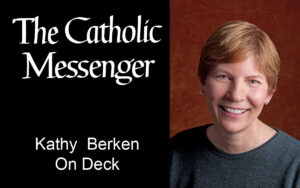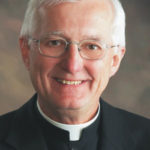By Kathy Berken
In a world reeling with insanity, many of us find ourselves feeling overwhelmed, wondering if the madness will ever end. Is there anything we can do to keep ourselves on a moral path, aligned with God, immersed in the peace of Christ that we may feel is desperately missing?
I believe there is a way to find our deepest spiritual desires in the midst of the mania, and that is through a regular practice of centering prayer, which I discovered about 40 years ago.
 In his book, “New Life for Old,” moral theologian Father Vincent MacNamara says that a continual process of transformation, fueled by meditation and contemplation, eliciting wisdom and understanding, is what we need most. Twenty minutes of centering prayer, practiced once or twice daily can help “create an environment of self-understanding leading to wisdom.”
In his book, “New Life for Old,” moral theologian Father Vincent MacNamara says that a continual process of transformation, fueled by meditation and contemplation, eliciting wisdom and understanding, is what we need most. Twenty minutes of centering prayer, practiced once or twice daily can help “create an environment of self-understanding leading to wisdom.”
We often live on autopilot, immersed in the noise and activity around us that tends to create “unthinking lives,” he says. A life of mindfulness in the practice of centering prayer can open ourselves to compassionate awareness in the present moment, leading to a deeper spiritual connection with God, allowing us to listen more deeply to God’s deepest desire for us.
Centering prayer has deep roots in Christianity, tracing its way to the fourth and fifth centuries in the spiritual practices of the Desert Mothers and Fathers, including John Cassian. It is the central theme in the medieval classic “The Cloud of Unknowing,” and was practiced by Saints Teresa of Avila and John of the Cross. In the 20th century, Trappist priests Fathers Thomas Merton and Thomas Keating revived it.
What is unique about centering prayer is what Fr. MacNamara calls a “reversal of energy — a shift from striving and achieving energy to surrendering to grace and wisdom.” It is “an act of faith in the mystery of the person.” It is a channel to openness, to truth, to the ultimate mystery, to “the absolutely transcendent Thou.” Centering prayer allows us to fulfill our human desire to oneness with God, a desire that leads to “the incomprehensibility of God that the ungraspable mystery has given itself to human history in the person of Jesus Christ.”
A regular centering prayer practice helps us discover where God dwells in the psalmist’s notion of the still point within, as Father Henri Nouwen described in his book, “Finding My Way Home:” “Peace is not primarily about doing. It is first of all the art of being.”
Franciscan Father Richard Rohr, who said that when we change the way we think, what we think flows easily, echoes this notion. “We will naturally move toward compassion, patience, understanding, forgiveness and inner freedom.” So, as we embody these virtues, we discover who we are and what the moral life means. It is within the silence of our hearts through the regular practice of centering prayer that spiritual transformation occurs.
We become more fully human, more deeply connected to God. Fr. MacNamara says our central mission, our worldly task as humans, as Christians, what is most crucial for us, is “the hoped-for transformation which in some fashion will align our minds and hearts with the loving-kindness and mercy of God.”
Poet Barbara Erakko Taylor also speaks to this in her “Silent Endings:” “I have let go of noise / the whirring machines and nightly news / slipping into a sweet sweet night / of silence / past the familiar portals / past the places I once played / letting go the grip / of my secure moorings / to a down, down inward falling / Oh, most gentle fall! / where all my unending / meet in one certainty: / Silence is naught but Love.”
An excellent resource on centering prayer is Contemplative Outreach, founded in the 1970s by three monks including Fr. Keating: www.contemplativeoutreach.org.
(Kathy Berken has a master’s degree in theology from St. Catherine University, St. Paul, Minn. She lived and worked at The Arche, L’Arche in Clinton 1999-2009 and is author of “Walking on a Rolling Deck: Life on the Ark (stories from The Arch).”)











